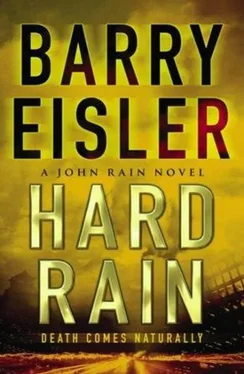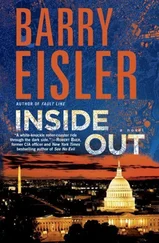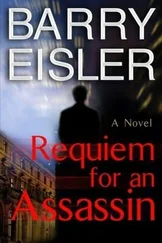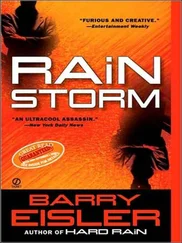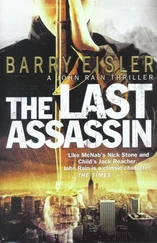The trick is to use hot water at the spigots where you sit, filling the sento -supplied low plastic pail with increasingly painful bucketfuls and pouring them over your head and body. If you bathe using only tepid water, the soaking tub will be unbearable when you first try to enter it.
Tatsu completed his cleaning cycle with characteristic brusqueness and got in the bath ahead of me. I took a bit longer. When I was ready, I eased in beside him. Immediately I felt my muscles trying to shrink back from the heat, and knew that in a moment they would give up their fruitless struggle and surrender to delirious relaxation.
“ Yappari, kore ga saiko da na ?” I said to him, feeling myself begin to unwind. This is great, isn’t it?
He nodded. “An unusual place for a meeting. But a good one.”
I settled deeper into the water. “You’ve been drinking all that tea, so I figured you’d appreciate a place that’s good for your health.”
“Ah, you were being considerate. I thought that perhaps this was your way of showing me you had nothing to hide.”
I laughed. I briefed him on the dojo and the underground fights, and on Murakami’s connection with both. I gave him my assessment of Murakami’s strengths and weaknesses: deadly, on the one hand; unable to blend, on the other.
“You say the promoters of these fights are losing money,” he said when I was done.
I watched the mural, my eyes half-closed. “Based on what Murakami told me, yes. At three fights in a night with two-million-yen payouts to the winners, plus expenses, they’ve got to be in the red. Even on those nights where they have two or even one, they can’t be doing more than breaking even.”
“What does that tell you?”
I closed my eyes. “That they’re not doing it for the money.”
“Yes. The question, then, is why are they doing it? What is the benefit they derive?”
I pictured the bridged, predatory smile. “Some of these people, like Murakami, are pretty sick. I think they enjoy it.”
“I’m sure they do. But I doubt that entertainment alone would be sufficient motive to create and sustain this kind of enterprise.”
“What do you think, then?”
“When you were with Special Forces,” he asked, his tone musing and thoughtful, “how did you treat personnel who performed a vital function for the unit?”
I opened my eyes and glanced at him. “Redundancy. A backup. Like an extra kidney.”
“Yes. Now put yourself in Yamaoto’s shoes. With you, he could quietly eliminate anyone who proved uninterested in his rewards, or invulnerable to his blackmail, or who otherwise presented a threat to the machine he has established. You served a vital function. Following your loss, Yamaoto would have learned not to allow such reliance on a single person. He would seek to build redundancy into the system.”
“Even if Murakami had been a total replacement.”
“Which you say he is not.”
“So the dojo Murakami is running, the fights…”
“It seems they constitute a training course of sorts.”
“A training course…,” I said, shaking my head. I saw him looking at me, waiting, one step ahead as usual.
Then I saw it. “Assassins?” I asked.
He raised his eyebrows, as if to say You tell me .
“The dojo is the course introduction,” I said, nodding. “And with the kind of training they do there, they’ve already selected for individuals predisposed to violence. Exposure every day, sometimes twice a day, to that regimen desensitizes the individual further. Being a spectator at actual death matches is the next step.”
“And the fights themselves…”
“The fights complete the process. Sure, the whole thing is just a form of basic training. Better, in fact, because only a relatively few soldiers who pass through basic training experience combat and killing afterward. Here, killing is part of the curriculum. And the cadre you create is composed only of the ones who survive, who are the most proficient at what they’ve learned.”
It made sense. A resort to assassins wasn’t even original. In past centuries, the shogun and daimyo employed ninja in their own internecine struggles. I remembered Yamaoto from our run-in a year earlier and knew he would probably be flattered by the comparison.
“Do you see how this development fits in with Yamaoto’s longer-range plans?” he asked.
I shook my head. It was hard to think through the penetrating heat.
He looked at me the way you might look at a slow but still likable child. “What are Japan’s overall prospects for the future?” he asked.
“How do you mean?”
“As a nation. Where will we be in ten, twenty years?”
I considered. “Not so well off, I suppose. There are a lot of problems-deflation, energy, unemployment, the environment, the banking mess-and no one seems to be able to do anything about it.”
“Yes. And you are correct in distinguishing Japan’s problems, which all countries have, from our powerlessness to solve those problems, in which respect we are unique among industrialized nations.”
He was looking at me, and I knew what he was thinking. Until recently, I had been one of the causes of that powerlessness.
“All that consensus-building takes time,” I said.
“Often it takes forever. But a cultural predisposition to consensus-building is not the real problem.” I saw a trace of a smile. “Even you were not the real problem. The real problem is the nature of our corruption.”
“Quite a few scandals lately,” I said, nodding. “Cars, nuclear, the food industry… I mean, if you can’t trust Mr. Donut, who can you trust?”
He grimaced. “What was happening at the TEPCO nuclear facilities was worse than a disgrace. The managers should be executed.”
“Are you asking me for another ‘favor’?”
He smiled. “I must take care in my phraseology when I’m talking to you.”
“Anyway,” I said, “didn’t the responsible TEPCO managers resign?”
“Yes, they resigned. While the regulators remained-the same regulators who get a cut from the funds allocated to the building and maintenance of nuclear plants, who only just publicized dangers they had known about for years.”
He pulled himself up and sat on the edge of the tub to take a break from the heat. “You know, Rain-san,” he said, “societies are like organisms, and no organism is invulnerable to disease. What matters is whether an organism can mount an effective defense when it finds itself under attack. In Japan, the virus of corruption has attacked the immune system itself, like a societal form of AIDS. Consequently, the body has lost its ability to defend itself. This is what I mean when I say that all countries have problems, but only Japan has problems it has lost the ability to solve. The TEPCO managers resign, but the men charged with regulating their activities for all those years remain? Only in Japan.”
He looked pretty down in the mouth, and I wished for a moment that he wouldn’t take this shit so seriously. If he kept it up, he’d have an ulcer the size of an asteroid. I sat down next to him.
“I know it’s bad, Tatsu,” I said, trying to give him a little perspective, “but Japan is hardly unique when it comes to corruption. Maybe it’s a little worse here, but in America, you’ve got Enron, Tyco, WorldCom, analysts pumping their clients’ stock to get their kids into the right preschools…”
“Yes, but look at the outrage those revelations have induced in America’s regulatory system,” he said. “Open hearings are conducted. New legislation is passed. Heads of corporations go to jail. But in Japan, outrage is considered outrageous. Our culture seems strongly disposed toward acquiescence, ne ?”
Читать дальше
